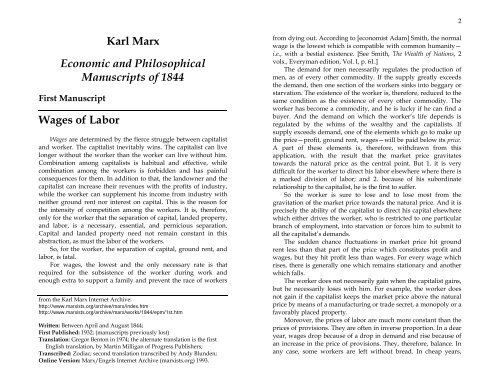

The influence of German Idealism informs great parts of Marx’s idea of human nature and its state under capitalism, namely the writings of Georg Wilhelm Friedrich Hegel and the more materialistic Ludwig Feuerbach. This condition of being human, as we will examine later, is threatened by what Marx referred to as estranged labor. (p.44) It forms a foundation for Marx’s thinking that a true state of being human can only be achieved in a community, going so far as to claim that an existence in social terms is unavoidable. society is the complete unity of man with nature - the true resurrection of nature - the consistent naturalism of man and the consistent humanism of nature.“ (p.44)Įven non-communal activities are necessarily social, since „my own existence is social activity“. „ human aspect of nature exists only for social man for only then does nature exist for him as a bond with man - as his existence for the other and the other’s existence for him - and as the life-element of human reality. Marx, however, is no advocate of the concept of an anthropological humanism for him, human beings have no abstract essence but are instead constituted in an historically grown environment: „just as society itself produces man as man, so is society produced by him.“ (p.44) Society’s and man’s relationship is reciprocal: not only is society produced by human beings, Marx also saw that this man-made society in turn has great effect on the human beings which are born into and inhabit it. In doing so, he perceives history as a process of man’s alienation and its necessary abolition man being history’s subject and labor being man’s essence.

In his Economic & Philosophic Manuscripts of 1844, Karl Marx proposes a potent and extensive philosophical analysis of the human being and its situation under a capitalist system.

Sources Marx in 1844 and his Humanistic Influences

A communist party is a political party that advocates the application of the social and economic principles of communism through state policy.Marx in 1844 and his Humanistic Influences
#ECONOMIC AND PHILOSOPHIC MANUSCRIPTS OF 1844. KARL MARX FREE#
Marx and Engels gave some description of communist society: Abolition of property in land, centralization of credit in the hands of the state, centralization of the means of communication and transport in the hands of the state, extension of factories and instruments of production owned by the state, free education for all children in public schools etc. In this conflict, the proletariat will rise up against the bourgeoisie and establish a communist society. That conflict would be solved, according to Marx, through revolutionary struggle. Struggle, Communist Society, Capitalist Society, ReligionĪBSTRACT: The capitalist system of exploitation of workers opened the door to the process of class conflict and created opposite social class such as bourgeoisie (those who own the means of production in capitalist society) and proletariat (individuals with labor power). The Struggle of Communist Society against the Capitalist Society and ReligionĪUTHORS: Coulibaly Yacouba, Xinmin Gao, Xixiang Sun Economic and Philosophic Manuscripts of 1844.


 0 kommentar(er)
0 kommentar(er)
